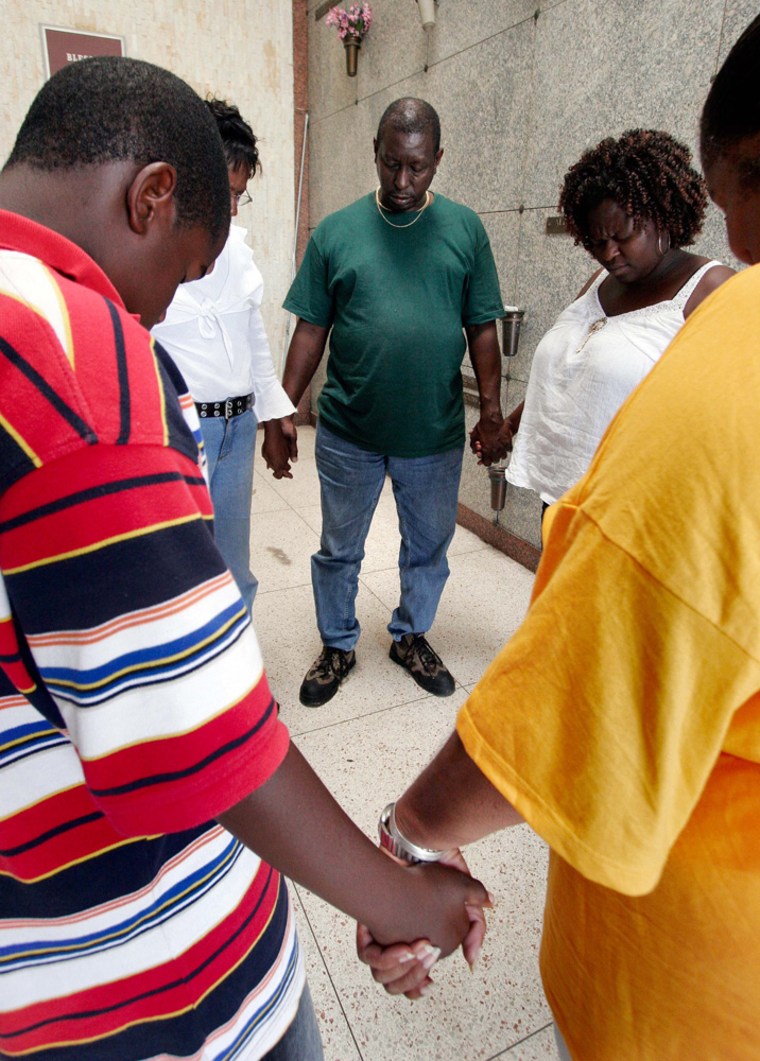In death, she became a symbol of government failure — an anonymous woman slumped in a wheelchair, abandoned outside one of the city’s overwhelmed hurricane shelters.
One year after her death, her family gathered to remember her, laying roses at her grave and preparing for a memorial.
“She was a nobody in life. She was just an ordinary woman, but God made sure she’d become someone in death,” said Veronica White, a friend of the family of 91-year-old Ethel Freeman, who died last Sept. 1 in the aftermath of Hurricane Katrina.
Her son, Herbert Freeman Jr., had wheeled her to the city’s convention center from their flooded home, expecting buses to carry them to safety. The buses arrived Sept. 4, but by then Ethel Freeman had been dead for four days.
After she died, her son tried to cover her face with a towel, but her arms and body stuck out. Someone offered Freeman a poncho, and he laid it over her.
The image was captured by numerous photographers and transmitted around the world, becoming one of the most memorable photos of the disaster.
When the buses arrived, the son begged the driver to take the woman’s body, but he was instead forced to board without her, leaving her in the wheelchair, pushed to the side of the cavernous building, a piece of paper attached to her clothes bearing his cell phone number.
After being evacuated to a shelter in Birmingham, Ala., Freeman saw her shroud-covered body on television and recoiled: “I felt angry about them exploiting her body like that.”
It would be two months before he found her again, in a morgue at St. Gabriel, La., alongside Katrina’s other anonymous dead.
Vengeance via lawsuits
On the one-year anniversary of her death, Ethel Freeman’s son joined White, who is now his fiancée, to offer a bouquet of roses at the New Orleans mausoleum where the elderly woman’s body was finally laid to rest.
“I asked God to take her soul and bless her and keep her safe — and to help me avenge her death, what society did wrong,” Freeman said. He recently filed two lawsuits, one accusing the state and city of negligence and the other aimed at federal authorities, including the Federal Emergency Management Agency and the Department of Homeland Security.
On Saturday, the family planned to hold a memorial service, celebrating her life through poems, Scripture and stories about her love for soul food and soap operas.
Ethel Freeman, a former custodian who retired in 1978, had broken both hips and was bedridden. She was legally blind and was fed through a tube in her stomach. Because of her frail health, her son thought it would be unwise to move her when an evacuation order was issued on Aug. 28, 2005, a day before Hurricane Katrina hit the city.
Their house survived the storm, but then came the flood. Freeman found a boat and placed his mother inside, then walked the vessel through hip-high water until reaching dry ground.
He began pushing her toward the Superdome. A passing police officer told them to head instead to the riverfront convention center, where buses were expected to arrive. There were medical supplies, food and water at the Superdome, but people who took refuge at the convention center had none.
Freeman began looking for a doctor at the convention center, only to find a second police officer who told him to wait on the pavement in the sweltering heat.
“He told me, ‘The buses are coming. Wait here so you can get your mom on first,”’ Freeman said Friday outside the building where his mother died.
Last words: Are buses coming?
She survived through Aug. 31 and into the next morning. She died quietly before dawn, exhausted and dehydrated. To feed her, Freeman needed to lay the old woman down. But he had no blanket and the pavement was crowded with people, so he couldn’t make room for her.
Her last words were a supplication: “She asked me if the buses were coming,” Freeman said. “I said, ‘Yeah, they’re coming. And then I said, ‘Ma, I’m going to pray to God to help me. And you pray to God to help you,” he said.
A few minutes later, he realized she had stopped talking.
